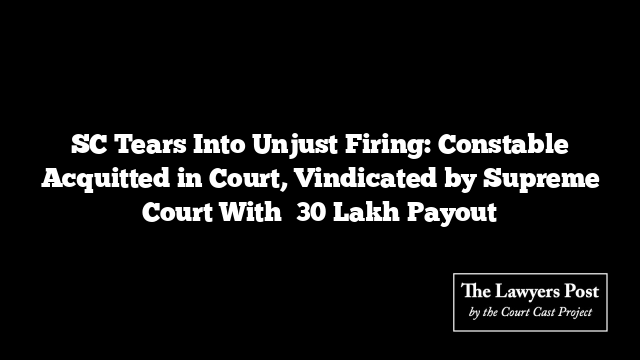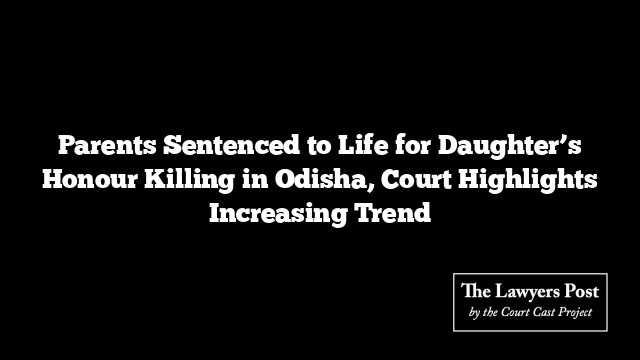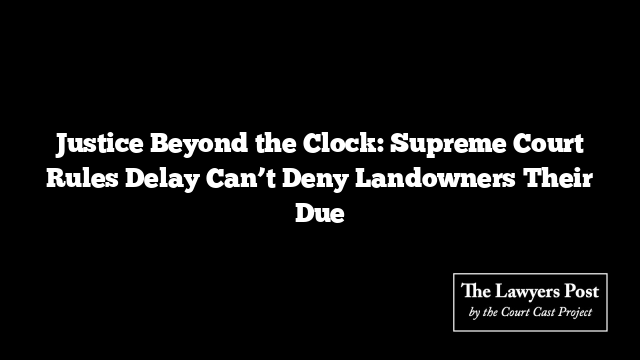In a scathing rebuke to procedural short-cuts and administrative opacity, the Supreme Court has ruled that a constable once dismissed from the Bihar Police force must be compensated with ₹30 lakhs—plus ₹5 lakhs in legal costs—after finding his termination fundamentally flawed and devoid of due process. The ruling underscores a critical legal principle: if criminal charges based on identical evidence collapse in court, disciplinary actions built on the same fragile foundation cannot be allowed to stand.
The case revolves around a constable in the Crime Investigation Department’s dog squad, who was accused of extortion in the mid-1990s. Even as he faced criminal prosecution, departmental proceedings galloped ahead, culminating in his dismissal on June 21, 1996. His request to delay the internal inquiry until the criminal case concluded was ignored, despite his concern that prematurely disclosing his defense would jeopardize his trial.
But in a dramatic turn, the Trial Court’s conviction was overturned on appeal on February 16, 1996—months before his dismissal. The acquittal wasn’t a technicality—it was a complete collapse of the prosecution’s case. Key witnesses refused to identify him in court. Still, the dismissal order stuck, upheld all the way through the High Court, triggering a last resort: the Supreme Court.
And that’s where the tide turned.
The apex bench—comprising Justices Dipankar Datta and Prashant Kumar Mishra—called out what it saw as a pattern of concealment and irregularity. The State of Bihar failed to submit the departmental inquiry records when summoned. According to the Court, this was no clerical lapse—it inferred a deliberate effort to hide procedural rot.
“The respondents did not deliberately produce the departmental file lest the illegality in proceeding against the appellant from the inception is exposed,” the Court remarked bluntly.
The judges invoked the doctrine of “adverse inference,” asserting that the deliberate withholding of crucial documents could only be seen as an attempt to suppress evidence that would vindicate the appellant.
Among the litany of violations uncovered:
- The same witnesses, evidence, and charges appeared in both the criminal and departmental proceedings—yet the internal inquiry reached the opposite conclusion after the criminal court acquitted him.
- Prosecution witnesses in the departmental proceedings were not cross-examined.
- The informant never appeared.
- The chargesheet was not properly attested, violating Rule 55 of the Civil Services (Classification, Control and Appeal) Rules, 1930.
- The charges themselves were vague and lacked specifics—a legal no-go.
Worse, the State shifted its story on whether the appellant was allowed to cross-examine a key witness he had accused of personal bias. Before the High Court, they claimed he never asked; before the Supreme Court, they claimed he chose not to.
“This demonstrates that the respondents have altered their position,” the Court noted, favoring the constable’s version: that he was never given a fair shot at challenging the witness.
The ruling emphasized that while acquittal in a criminal court doesn’t automatically overturn a disciplinary dismissal, when both proceedings rely on essentially the same material, a contradiction between outcomes renders the disciplinary action oppressive and unjust.
By the end of its judgment, the Court not only found that due process was “completely lacking” but also concluded that the entire disciplinary process had been infected from the start.
With that, the Court ordered ₹30 lakhs in compensation and ₹5 lakhs in costs to the man who had spent nearly three decades seeking justice after being dismissed from service on evidence already deemed worthless in a criminal court.
Justice, delayed—but delivered with interest.





